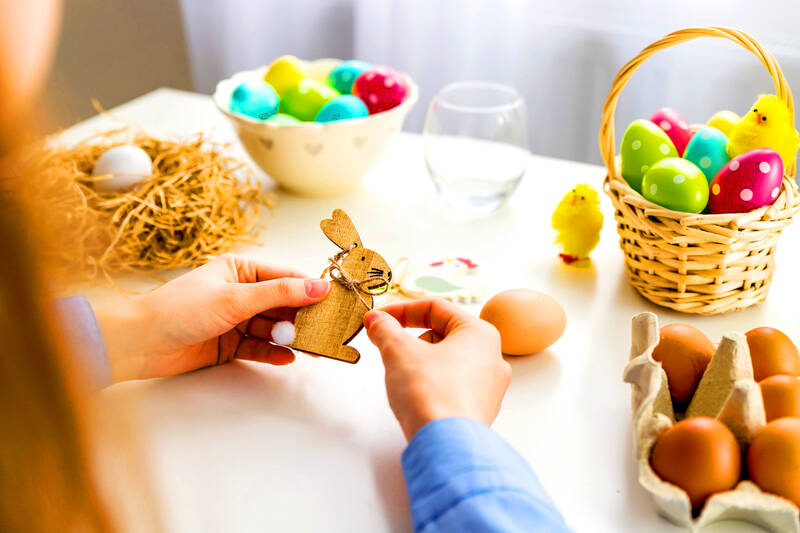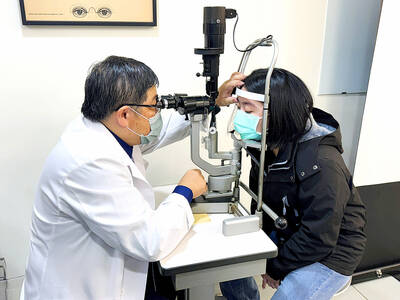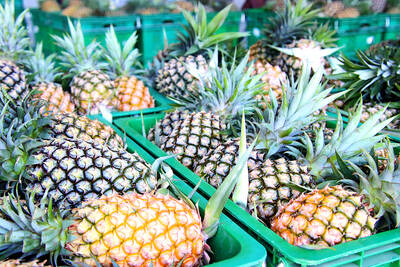對話 Dialogue
清清:我香港朋友說禮拜五下班以後就要飛來找我,我們好久沒見了,真期待!
Qīngqing: Wǒ Xiānggǎng péngyǒu shuō lǐbài wǔ xiàbān yǐhòu jiù yào fēi lái zhǎo wǒ, wǒmen hǎojiǔ méi jiàn le, zhēn qídài!

Photo: Piqsels / 照片:Piqsels 提供
華華:就一個週末好趕,時間夠嗎?
Huáhua: Jiù yíge zhōumò hǎo gǎn, shíjiān gòu ma?
清清:她說剛好是復活節假期,可以好好安排。
Qīngqing: Tā shuō gānghǎo shì Fùhuó jié jiàqí, kěyǐ hǎohǎo ānpái.
華華:喔!去年復活節,一個信教的同學還送了我一隻玩具兔呢!
Huáhua: Ō! Qùnián Fùhuó jié, yíge xìnjiào de tóngxué hái sòngle wǒ yì zhǐ wánjù tù ne!
清清:朋友會住在我家,她說她要做羊肉和麵包請我吃。
Qīngqing: Péngyǒu huì zhù zài wǒjiā, tā shuō tā yào zuò yángròu hàn miànbāo qǐng wǒ chī.
華華:你們要不要也畫畫彩蛋?可以用蔬菜當天然的染料。
Huáhua: Nǐmen yào búyào yě huàhuà cǎidàn? Kěyǐ yòng shūcài dāng tiānrán de rǎnliào.
清清:這個主意讚!又應景又好玩。你也一起來吧!
Qīngqing: Zhèige zhǔyì zàn! Yòu yìngjǐng yòu hǎowán. Nǐ yě yìqǐ lái ba!
華華:好啊!你朋友不介意的話,就去找你們熱鬧熱鬧,謝謝邀請喔!
Huáhua: Hǎo a! Nǐ péngyǒu bú jièyì dehuà, jiù qù zhǎo nǐmen rènào rènào, xièxie yāoqǐng o!
翻譯 Translation
Qingqing: My friend from Hong Kong said she’s flying over to see me after work on Friday. We haven’t seen each other in so long, I’m really looking forward to it.
Huahua: Just for the weekend? That feels rushed, is there enough time?
Qingqing: She said it’s perfect timing because it’s the Easter holiday, so she can plan it well.
Huahua: Oh. Last Easter, a Christian classmate gave me a toy bunny.
Qingqing: My friend will stay at my place. She said she’s going to make lamb and bread for me.
Huahua: Are you guys going to paint Easter eggs? You can use vegetables for natural dyes.
Qingqing: That’s a great idea. It’s festive and fun. You should join us too.
Huahua: Sure. If your friend doesn’t mind, I’ll come join in on the fun. Thanks for the invite.
生詞 Vocabulary
1. 安排 (ānpái) arrange
2. 期待 (qídài) look forward to
3. 趕 (gǎn) rush, hurry
4. 信教 (xìnjiào) religious, a believer
5. 玩具 (wánjù) toy
6. 彩蛋 (cǎidàn) Easter egg
7. 讚 (zàn) awesome, great
8. 應景 (yìngjǐng) timely, suitable for the occasion
教材音檔 Audio Files
國立清華大學華語中心提供
By National Tsing Hua University Chinese Language Center:

A: Recently, I’ve been seeing mosquitoes flying around in front of my eyes. The doctor said it’s the “flying-mosquito disease.” B: Flying mosquitoes? What a strange name. A: They’re actually called “floaters” in English, meaning floating debris. When fibrous substances in the vitreous body inside the eyeballs increase, floaters can appear in the visual field. B: Oh my goodness. Can you get rid of them? A: According to ophthalmologist Horng Chi-ting’s research, taking the enzymes of certain fruits is likely to help reduce floaters. A: 我最近一直覺得眼前有蚊子飛來飛去,結果醫生說是「飛蚊症」。 B: 飛蚊症?好奇怪的病名。 A: 英文名稱叫「floaters」, 也就是漂浮物的意思。 因為眼球的玻璃體中纖維化物質增多,導致視野出現漂浮物。 B: 天啊!要怎麼把蚊子趕走? A:

In Taiwan, people can use a platform to rent a power washer for a weekend or share unused garage space for someone’s storage needs. These are examples of the sharing economy, a consumption model that has gained widespread adoption worldwide. This approach allows people to rent or share assets like cars, homes or even services, typically through online platforms. This innovative model poses a simple yet powerful question: why purchase infrequently used items when sharing is more practical? By making useful but idle resources accessible, the sharing economy turns them into sustainable opportunities. Internationally, platforms like Airbnb and Uber have popularized

Bilingual Story is a fictionalized account. 雙語故事部分內容純屬虛構。 I stand by the Miluo River as dusk falls. The court betrayal is too much. I served Chu with loyalty. I forged alliances and fought corruption. But the whispers of jealous courtiers, the murmurs of treason, spoke louder. The king cast me out. The water looks calm. It promises peace. I step in. The river is cold against my legs. I hear shouts behind me — fishermen calling my name. I keep walking. The calls grow louder, but I do not turn around. The water rises to my chest. It pulls at me. I

A: What types of fruit enzymes should we take to help reduce eye floaters? B: According to a study published in the “Applied Sciences” journal by Taiwanese ophthalmologist Horng Chi-ting, pineapple, papaya and fig supplements can improve symptoms. A: Pineapples are in season now, so you should munch on more of those to get rid of floaters. B: Not quite. Enzymes can be damaged by our stomach acid if we eat the fruit directly. The doctor says taking fruit enzyme capsules is better for absorption. A: Most importantly, we should reduce our use of personal electronics to prevent floaters from